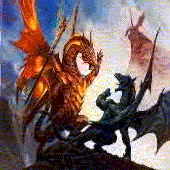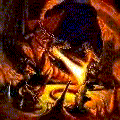 Warfare
Warfare
 Warfare
Warfare
![]()
Warfare is a prominent theme in Beowulf . The reasons and conduct for and during warfare are mentioned and displayed throughout the poem. The reason for warfare is usually for retribution. As an act of revenge, battles are fought. The conduct is also very standard and prevalent. All warfare fought by honorable men had to be fought fair. If the opposing side bore no weapons, then the other side also used no weapons. The author of this poem depicts himself/herself to be an advocate of warfare. By idolizing Beowulf because of his heroic deeds during warfare, the poet makes armed conflict courageous and noble.
The reasons for bloodshed are spelled out quite well when noble Beowulf consoles his sad friend, Hrothgar concerning his friends demise. He tells him: " Sorrow not wise warrior. It is better for a man to avenge his friend than much to mourn" (Norton 45). Beowulf advocates and promises to avenge Aeschere’s death during warfare with the slayer, Grendel’s mother. The act of battle is given a reason and purpose which is to avenge a death.
Conduct in warfare might be "every man for himself" in today’s world however, during Beowulf’s time, the poet shows that honor was the most valuable asset. Upon knowledge that Grendel used no weapons, just bare flesh, Beowulf immediately put his weapons aside and promised to fight empty handed, so the fight would be fair. "I have also heard say that the monster in his recklessness cares not for weapons......I scorn to bear sword or broad shield, yellow wood, to the battle, but with my grasp I shall grapple with the enemy and fight for life, foe against foe " (Norton 32). An unfair fight, as the poet implies, has no glory or distinction. This proves Beowulf to be a worthy hero and role-model.
 The poet gives the
impression that warfare is honorable and exciting. This does not imply that the poet likes
bloodshed; it refers to honorable warfare. Honorable warfare includes a good reason
and virtuous conduct. The poet can not be a pacifist because he/she describes Beowulf as a
savior and hero. If the poet was a pacifist he/she would have described him as an
egotistical bully. The poet makes Beowulf an icon and noble warrior. Beowulf is described
as " …survived every combat, every dangerous battle, every deed of
courage…" also called "..great-spirited noble, brave of
deeds.."(Norton 57,61). Battle scars seem to be a honor and bragging-right to the
poet.
The poet gives the
impression that warfare is honorable and exciting. This does not imply that the poet likes
bloodshed; it refers to honorable warfare. Honorable warfare includes a good reason
and virtuous conduct. The poet can not be a pacifist because he/she describes Beowulf as a
savior and hero. If the poet was a pacifist he/she would have described him as an
egotistical bully. The poet makes Beowulf an icon and noble warrior. Beowulf is described
as " …survived every combat, every dangerous battle, every deed of
courage…" also called "..great-spirited noble, brave of
deeds.."(Norton 57,61). Battle scars seem to be a honor and bragging-right to the
poet.
The attitude towards warfare as given by the poet is one of awe and commendability. Of course, the reason for combat must be of noble nature. In Beowulf ,revenge for a kinsmen death counted as a good reason. And its outcome proved that if the motive was good, victory was sure. Conduct during warfare also had standards. A fair fight when lost has more admiration than undeserved success by cheating. The poet gives the reader a message of nobility and reverence of righteous warriors and considers warfare totally acceptable and expected when warranted.